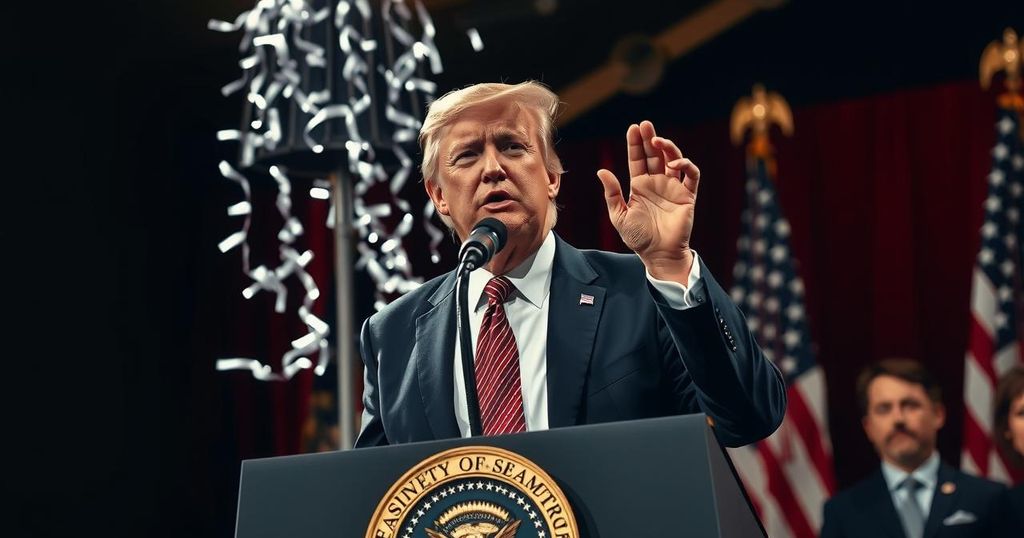Donald Trump Elected as 47th President Amid Voter Discontent and Global Uncertainty

Donald Trump has been elected the 47th president of the United States, achieving at least 277 Electoral College votes against Vice President Kamala Harris. His victory in crucial battleground states reflects widespread voter discontent and anger, fueling a remarkable comeback from his 2020 defeat. Trump’s promises to address economic concerns and reshape national policies signal a transformative yet potentially tumultuous era in American politics.
Donald Trump has been elected as the 47th president of the United States, securing at least 277 Electoral College votes as reported by The Associated Press. This victory marks his return to the White House, decisively defeating Vice President Kamala Harris in a race that was less competitive than anticipated. Trump’s success in pivotal battleground states such as Wisconsin, Georgia, North Carolina, and Pennsylvania allowed him to surpass the necessary 270 Electoral College votes with a total of 277 votes to Harris’s 224. Polls had indicated that the contest would be much closer, yet Trump’s appeal tapped into widespread discontent and anger among the electorate, underlying his remarkable resurgence from his previous defeat in 2020. Despite the controversy surrounding his past, including a violent Capitol insurrection and felony charges, Trump’s campaign effectively capitalized on economic concerns and burgeoning frustrations regarding the Biden administration’s policies. Professor Scott Lucas emphasized that “there is anger and resentment in the US, which has been there for quite some time,” suggesting that these sentiments played a crucial role in Trump’s electoral success. Trump’s opposition to Biden’s support for Ukraine in its conflict with Russia and dissatisfaction regarding the administration’s handling of wars involving Israel and Gaza also resonated strongly with voters. Upon declaring victory, Trump heralded his win as the acquisition of “an unprecedented and powerful mandate,” illustrating his intent to push forward with a significant domestic agenda. As he navigates complex global issues, his propositions, including concluding the war in Ukraine swiftly, have raised concerns among international allies, especially regarding NATO’s stability. Furthermore, Trump’s pro-Israel stance and strategies towards Iran and China signal a potentially aggressive approach in foreign relations, inciting unease among both allies and adversaries alike. At home, Trump’s supporters expect him to prioritize American welfare and implement transformative policies, including ambitious immigration reforms. However, experts warn that his presidency may lead to a more perilous era, characterized by unpredictable governance tailored to serve his individual interests rather than coherent national policy. Thus, Trump’s return to power raises significant questions about future US domestic and foreign policy dynamics.
The recent presidential election has witnessed Donald Trump reclaiming the presidency as the 47th president of the United States. The electoral outcome signals critical shifts in voter sentiment, largely attributed to widespread dissatisfaction with the current administration’s management of economic and geopolitical challenges. Trump’s prior administration and the controversies that surrounded it, including the aftermath of the Capitol insurrection, are significant factors influencing public perception and political engagement. Understanding the underlying issues, such as voter anger, economic concerns, and international relations, is vital to discerning the implications of Trump’s victory on both domestic and global stages.
In conclusion, Donald Trump’s election as the 47th president reflects a profound voter reaction rooted in anger and discontent towards the current political landscape. His overwhelming triumph in key battleground states and the subsequent promise of radical transformative policies signal a decisive shift in American politics. As Trump gears up to execute a controversial agenda, the implications for US domestic policies and international relations warrant careful scrutiny, as the nation prepares for what many foresee as a more volatile geopolitical environment under his leadership.
Original Source: www.aljazeera.com







